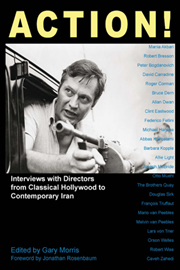Book contents
- Frontmatter
- Contents
- Foreword, by Jonathan Rosenbaum
- Editor's Preface
- Acknowledgements
- Introduction: The Art and Craft of Interviewing
- I Going Hollywood: Masters of Studio Style
- II Tickets to the Dark Side: Festival Favorites
- III Blows Against the Empire: Indie Godfathers
- IV Edgeplay: Avant-Garde Auteurs
- 12 An Actionist Begins to Sing: Otto Muehl, by Andrew Grossman
- 13 “They're Panicking, Look at Them!” The Brothers Quay
- V Women in Revolt: Artist-Activists
- VI The Canon: Brilliance without Borders
- Contributor Biographies
12 - An Actionist Begins to Sing: Otto Muehl, by Andrew Grossman
from IV - Edgeplay: Avant-Garde Auteurs
Published online by Cambridge University Press: 05 March 2012
- Frontmatter
- Contents
- Foreword, by Jonathan Rosenbaum
- Editor's Preface
- Acknowledgements
- Introduction: The Art and Craft of Interviewing
- I Going Hollywood: Masters of Studio Style
- II Tickets to the Dark Side: Festival Favorites
- III Blows Against the Empire: Indie Godfathers
- IV Edgeplay: Avant-Garde Auteurs
- 12 An Actionist Begins to Sing: Otto Muehl, by Andrew Grossman
- 13 “They're Panicking, Look at Them!” The Brothers Quay
- V Women in Revolt: Artist-Activists
- VI The Canon: Brilliance without Borders
- Contributor Biographies
Summary
As I reflect on a lifetime of canonical film-watching, I realize that what I've learned is, though not entirely worthless, probably useless. A certain director swerves the camera around emphatically, one employs moody colors, another bores us to death with selfimportantly minimalist narratives, and so forth. Though cinephiles and pedants insist that I should care about matters of style, I am tempted to half-jokingly agree with the Maoists and assent that the enterprise of the cinema–which can now only be repaired with the most radical consciousness-raising–is morally bankrupt and deserving of total abandonment.
I therefore shun the cineaste's narrow parameters and seek a new art, not a projected frame supervised by commerce and critics but an art that strives for a new, autonomous way of being. Nothing better represents such a praxis than the 1960s Austrian actionist movement, whose principal members–Otto Muehl, Rudolph Schwarzkogler, Günter Brus and Hermann Nitsch–scandalized the public with materialistic body art, staged saturnalia, and polymorphous perversity under the banners of the “Vienna Action Group” and the “Institute for Direct Art.” Sometimes the actionists would be jailed on public obscenity charges, and in the 1960s actionist art became the subject of momentous German and Austrian censorship trials. In the early 1990s, Muehl became the subject of a highly politicized trial once again: accused of raping and molesting underage members of his actionist commune, he was imprisoned for seven years.
- Type
- Chapter
- Information
- Action! , pp. 175 - 206Publisher: Anthem PressPrint publication year: 2009



